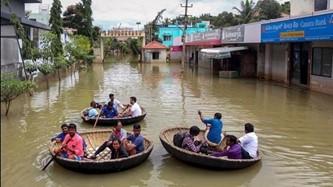By leveraging AI, Google's research has enabled accurate flood forecasts up to 7 days in advance in areas without local streamflow measurements, expanding coverage to 80 countries and benefiting 460 million people. The use of global data and LSTM networks has allowed for advancements in regions previously lacking in reliable data, making flood forecasts in Africa as accessible as those in Europe. These efforts are detailed in a paper published in Nature and demonstrate the potential of AI in enhancing global flood forecasting capabilities, thereby offering early warnings to vulnerable communities and contributing to disaster preparedness on a large scale.

Floods are the most common type of natural disaster and nearly 1.5 billion people, or some 19 percent of the world population, are directly exposed to substantial risks from severe flood events worldwide. Flooding also exacts an immense material toll, causing around $50 billion in annual global economic damages. For most of history, accurate flood forecasting at scale was not possible due to the complexity of the problem and lack of resources and data. Given that only a small percentage of the world’s rivers are equipped with streamflow gauges, this provided an extra barrier to safety for people in developing countries as well as in underserved and vulnerable communities. In a paper published in Nature (https://www.nature.com/articles/s41586-024-07145-1), Google shares how AI can help scale flood forecasting and bring help to parts of the world that are most impacted by climate change. They found that AI helped us to provide more accurate information on riverine floods up to 7 days in advance. This allowed us to provide flood forecasting in 80 countries in areas where 460 million people live. Where possible, they also provide forecasts in Google Search and Google Maps and via Android notifications.
The paper — described in more detail in their Research blog — demonstrates how AI-based global hydrologic technologies built by Google Research can significantly improve flood forecasting relative to the current state-of-the-art. This is even true for countries where reliable flood-related data is scarce, making it possible to expand flood forecasting on a global scale. Early warning systems can significantly help reduce fatalities, and having more lead time is extremely helpful for communities. With these technologies that extended, on average, the reliability of currently-available global nowcasts from zero to five days, and they were able to use AI-based forecasting to improve forecasts in regions in Africa and Asia to be similar to what are currently available in Europe.
The pivot to a global AI-based flood forecasting model and expansion to over 80 countries Recognizing the barriers to flood forecasting when relying on local data, and the advances in AI research, Google’s team pivoted towards an ambitious global model. That required global data sources to train model on using LSTM networks with the goal of predicting floods even in regions that don’t provide local streamflow measurements. In 2022, Google launched the Flood Hub platform, which provided access to forecasts in 20 countries — including 15 in Africa — where forecasting had previously been severely restricted due to the lack of global data. A year later, in 2023, they added locations in 60 new countries across Africa, the Asia-Pacific region, Europe, and South and Central America, covering some 460 million people globally. As a result, forecasts are now freely available on the Flood Hub in real time to many vulnerable communities in developing countries. Due to advances in global AI-based model, access to flood forecasting in Africa is now comparable to that of Europe.
Sources:
https://blog.google/technology/ai/google-ai-global-flood-forecasting/ .
Provided by the IKCEST Disaster Risk Reduction Knowledge Service System
Comment list ( 0 )
